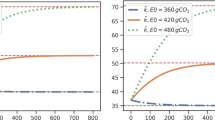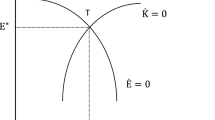Abstract
This paper addresses social accounting numerically in a dynamic generalequilibrium model. The main purposes are to study: (i) whether emissiontaxes based on static willingness to pay information can be used to improvethe welfare level, and; (ii) whether these taxes provide close enoughapproximations of the correct Pigouvian emission tax to be useful in thecontext of social accounting. The results indicate that, if environmentalquality is relatively linear with respect to pollution, the approximation ofthe Pigouvian emission tax will bring the economy close to the sociallyoptimal solution and, at the same time, provide a close approximation of thevalue of net investments in environmental capital.
Similar content being viewed by others
References
Aronsson, T. (1998), Welfare ‘Measurement, Green Accounting and Distortionary Taxes’, Journal of Public Economics 70, 273-295.
Aronsson, T. and K-G. Löfgren (1993), ‘Welfare Consequences of Technological and Environmental Externalities in the Ramsey Growth Model’, Natural Resource Modeling 7, 1-14.
Aronsson, T. and K-G. Löfgren (1995), ‘National Product Related Welfare Measures in the Presence of Technological Change, Externalities and Uncertainty’, Environmental and Resource Economics 5, 321-332.
Aronsson, T. and K-G. Löfgren (1999a), ‘Pollution tax design and “Green” National Accounting’, European Economic Review 43, 1457-1474.
Aronsson, T. and K-G. Löfgren (1999b), ‘Welfare Equivalent NNP under Distributional Objectives’, Economics Letters 63, 239-243.
Brock, W. (1977), ‘A Polluted Golden Age’, in V.L. Smith, ed., Economics of Natural and Environmental Resources. Gorden and Breach, New York.
Dasgupta, P. and K-G. Mäler (1991), The Environment and Emerging Development Issues. Beijer Reprint Series, no. 1, The Royal Swedish Academy of Science.
Hanemann, W.M. (1994), ‘Valuing the Environment Through Contingent Valuation’, Journal of Economic Perspectives 8(4), 19-43.
Hartwick, J. (1990), ‘Natural Resources, National Accounting and Economic Depreciation’, Journal of Public Economics 43, 291-304.
Kemp, M.C. and N. van Long (1982), ‘On the Evolution of Social Income in a Dynamic Economy: Variations on the Samuelsonian Theme’, in G.R. Feiwel ed., Samuelson and Neoclassical Economics. Boston, Mass. Kluwer-Nijhoff.
Löfgren, K-G. (1992), ‘Comments on C.R. Hulten, Accounting for the Wealth of Nations: The Net Versus Gross Output Controversy and Its Ramifications’, Scandinavian Journal of Economics 94(supplement), 25-28.
Mäler, K-G. (1991), ‘National Accounts and Environmental Resources’, Environmental and Resource Economics 1, 1-15.
Michel, P. (1982), ‘On the Transversality Condition in Infinite Horizon Optimal Control Problems’, Econometrica 50, 975-985.
Nordhaus, W. (1995), The Swedish Dilemma: Nuclear Energy Versus the Environment. Yale University.
Seierstad, A. and K. Sydsaeter (1987), Optimal Control Theory with Economic Applications. North-Holland, Amsterdam.
Tahvonen, O. and J. Kuuluvainen (1993), ‘Economic Growth, Pollution and Renewable resources’, Journal of Environmental Economics and Management 24, 101-118.
Weitzman, M.L. (1976), On the Welfare Significance of National Product in a Dynamic Economy’, The Quarterly Journal of Economics 90, 156-162.
Author information
Authors and Affiliations
Rights and permissions
About this article
Cite this article
Backlund, K. On the Role of Green Taxes in Social Accounting. Environmental and Resource Economics 25, 33–50 (2003). https://doi.org/10.1023/A:1023660017907
Issue Date:
DOI: https://doi.org/10.1023/A:1023660017907




